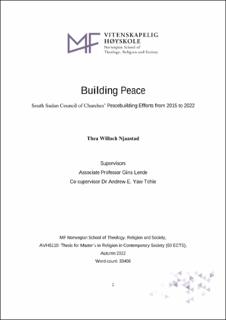| dc.description.abstract | The thesis explores religious peacebuilding in South Sudan by examining the opportunities and constraints South Sudan Council of Churches experienced in its peacebuilding efforts from 2015 to 2022. The study contributes to the debate on religion’s role in peace and conflict and religious actors’ potential to build peace. The thesis argues that religious peacebuilding must be understood by socio-politics and theology in tandem. Religious actors’ potential to build peace is largely determined by the civic space allowed by the government, and religious actors’ relation to the authorities. In South Sudan, there is a unique bond between religious actors and the government, dating from the independence struggle. The relationship has given religious actors leeway in peacebuilding that other parts of civil society have not had. However, South Sudan Council of Churches balances closeness with independence so as not to be held responsible for the government’s actions. In addition to socio-politics, it is crucial to recognize religious actors’ motivation and justification for peacebuilding to fully understand the potential of religious peacebuilding. Religious actors in South Sudan justify their peacebuilding efforts with theology and use the Bible to accentuate peace, unity, and harmonious living. The case study was conducted in 2022, using semi-structured interviews and a thematic analysis of South Sudan Council of Churches’ written statements. | en_US |
